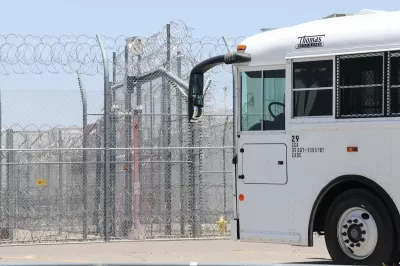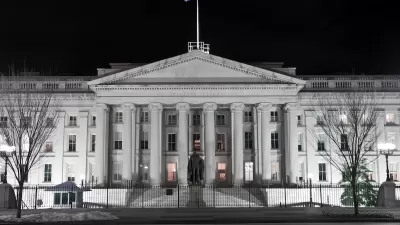People with criminal convictions are 10 times as likely to become homeless as others. Small policy shifts could change that.

A podcast episode from Next City explains how changes in local laws could help prevent people with criminal convictions from becoming homeless.
For a long time, the Department of Housing and Urban Development (HUD) has contributed to the problem by giving each local public housing authority (PHA) room to discriminate against people with convictions. In 2016, the agency published a memo clarifying that PHAs couldn’t have blanket prohibitions on all criminal offenses and providing screening criteria.
However, discrimination at public housing authorities still occurs, prompting HUD to issue a proposal this year that would bar PHAs from “categorically denying apartments because of criminal convictions.”
The episode goes into detail about how the housing crisis particularly affects people with convictions, who are almost 10 times as likely to experience homelessness than the general public. According to the Prison Policy Initiative, “Local PHAs can — and do — exercise a great deal of discretion when crafting and implementing their policies that determine who is and isn’t eligible for low-income public housing. While HUD provides guidelines on criteria for access and denial (24 CFR §982.553), individual PHAs often make their policies even more restrictive than the HUD recommendations.”
FULL STORY: We Can Just Decide Not To Evict People With Convictions From Public Housing

Study: Maui’s Plan to Convert Vacation Rentals to Long-Term Housing Could Cause Nearly $1 Billion Economic Loss
The plan would reduce visitor accommodation by 25,% resulting in 1,900 jobs lost.

Alabama: Trump Terminates Settlements for Black Communities Harmed By Raw Sewage
Trump deemed the landmark civil rights agreement “illegal DEI and environmental justice policy.”

Why Should We Subsidize Public Transportation?
Many public transit agencies face financial stress due to rising costs, declining fare revenue, and declining subsidies. Transit advocates must provide a strong business case for increasing public transit funding.

Paris Bike Boom Leads to Steep Drop in Air Pollution
The French city’s air quality has improved dramatically in the past 20 years, coinciding with a growth in cycling.

Why Housing Costs More to Build in California Than in Texas
Hard costs like labor and materials combined with ‘soft’ costs such as permitting make building in the San Francisco Bay Area almost three times as costly as in Texas cities.

San Diego County Sees a Rise in Urban Coyotes
San Diego County experiences a rise in urban coyotes, as sightings become prevalent throughout its urban neighbourhoods and surrounding areas.
Urban Design for Planners 1: Software Tools
This six-course series explores essential urban design concepts using open source software and equips planners with the tools they need to participate fully in the urban design process.
Planning for Universal Design
Learn the tools for implementing Universal Design in planning regulations.
Smith Gee Studio
Alamo Area Metropolitan Planning Organization
City of Santa Clarita
Institute for Housing and Urban Development Studies (IHS)
City of Grandview
Harvard GSD Executive Education
Toledo-Lucas County Plan Commissions
Salt Lake City
NYU Wagner Graduate School of Public Service





























